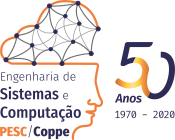Events Calendar
|
O Ciclo de Seminários PESC encerra o ano em grande estilo com uma palestra do prof. David Gamez (Middlesex University, Inglaterra) que vai abordar um tema antigo e instigante que com a atual onda de inteligência artificial voltou a ganhar destaque: modelagem (matemática) da consciência.
Entender e representar a consciência humana é um passo importante para que possamos criar máquinas que tenham consciência. Apesar de ser especialista no assunto, a palestra do prof. David será introdutória e irá abordar esta e outras questões.
Ele visita o PESC à convite dos profs. Priscila e Felipe, e vai participar de uma banca de doutorado.
Programe-se, participe e ajude na divulgação!
Mais detalhes abaixo ou clicando aqui.
------------------
Palestrante:
David Gamez, Lecturer at Middlesex University, England
Título:
Understanding and Modelling Consciousness
Dia/horário/local:
16/12 (segunda) - 11h - sala H-324B
Resumo:
The first part of my talk will explain how our modern concept of consciousness emerged. In the 17th Century many people used the properties of invisible atoms to explain regularities in the world. This led to a distinction between primary qualities, such as size, which were properties of the atoms, and secondary qualities, such as colour, which appeared when atoms interacted with our senses. Secondary qualities were real non-physical properties that had to be accommodated somewhere. Galileo's and Locke's solution was to locate secondary qualities in consciousness. While modern science has more elaborate physical descriptions, consciousness continues to be a placeholder for experiences that cannot be captured by a physical description.
Philosophers often study the relationship between consciousness and the physical world using thought experiments. For example, in the hard problem of consciousness, philosophers imagine a red object, imagine activity in a grey neuron, and try (and fail) to imagine the relationship between the two. A more promising methodology is to measure consciousness, measure the physical world and look for correlations between the two sets of data. Using this scientific approach, we might be able to discover precise mathematical relationships between measurements of consciousness and measurements of the physical world, which could be used to make accurate predictions about conscious states.
The last part of my talk will discuss how scientific research on consciousness connects with models of consciousness and conscious machines. Many people have built neural and cognitive models of the correlates of consciousness, which have been used to improve our understanding of consciousness in the brain and to build intelligent machines. Models of conscious experience have also been used to control robots. There are no grounds for believing that systems based on these types of models have real conscious experiences. However, if science could discover mathematical relationships between consciousness and the physical world, then it would become possible to build machines with specific states of consciousness and to make accurate predictions about the consciousness of machines.
Bio resumida:
Holding two PhD, one in Computing and Electronic Systems and the other in Philosophy, both from Essex University, David Gamez is currently a lecturer at the Department of Computer Science, Middlesex University. From 2012-2015 he was supported by a JTF Turing Research Fellowship at the Sackler Centre for Consciousness Science, where he worked on a three year project on the scientific study of natural and artificial minds. Between 2010 and 2012 he worked with Murray Shanahan at the Department of Computing at Imperial College London. As part of the EPSRC project 'Modular Neural Simulation with Reconfigurable Hardware' I integrated the NeMo CUDA accelerated neural simulator with his SpikeStream neural simulator and contributed to the development of the iSpike sensory interface for the iCub robot. From 2009-2010 he worked with Igor Aleksander on a new technique for analyzing neural networks for information integration. In 2008, his PhD on machine consciousness, supervised by Professor Owen Holland at the University of Essex, UK, was carried out as part of the EPSRC-funded CRONOS project to build a conscious robot. His contribution to this project included the development of new techniques for analyzing systems for signs of consciousness and hebuilt a spiking neural simulator that he used to model a neural network that controlled the eye movements of a virtual robot. In his previous job on the IST Safeguard project he worked on agents, anomaly-detection and GOFAI. His most recent book, Human and Machine Consciousness, explains how we can neutralise the traditional philosophical problems with consciousness and develop a science of consciousness that can make accurate predictions about the consciousness of humans, animals and machines. His first book, What We Can Never Know, explores the limits of philosophy and science through studies of perception, time, madness and knowledge.






